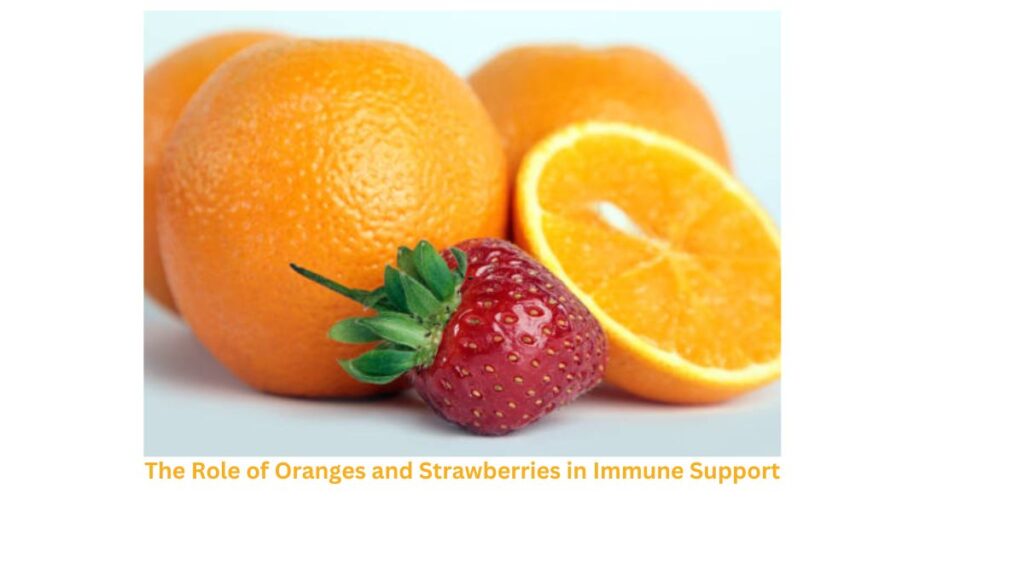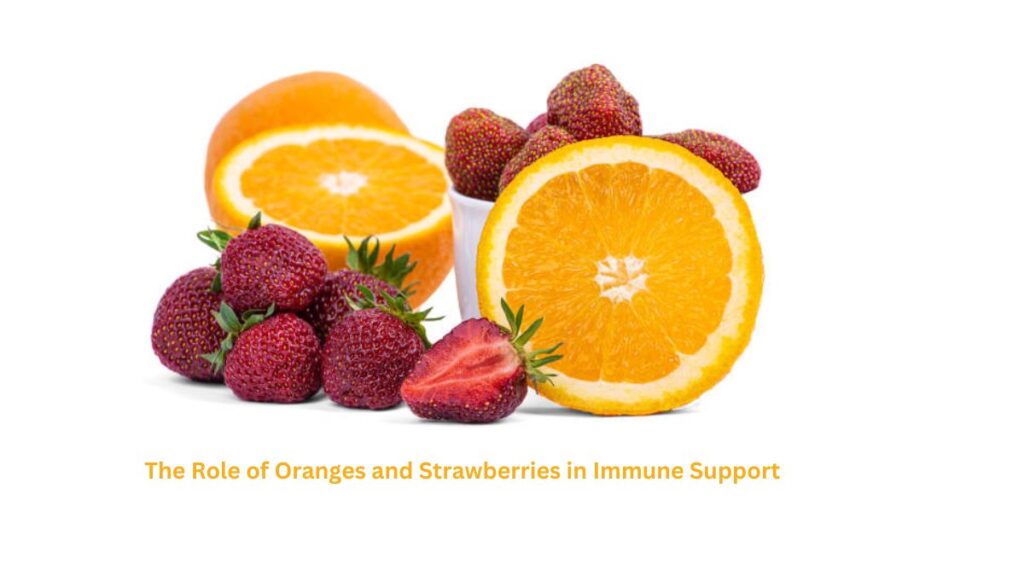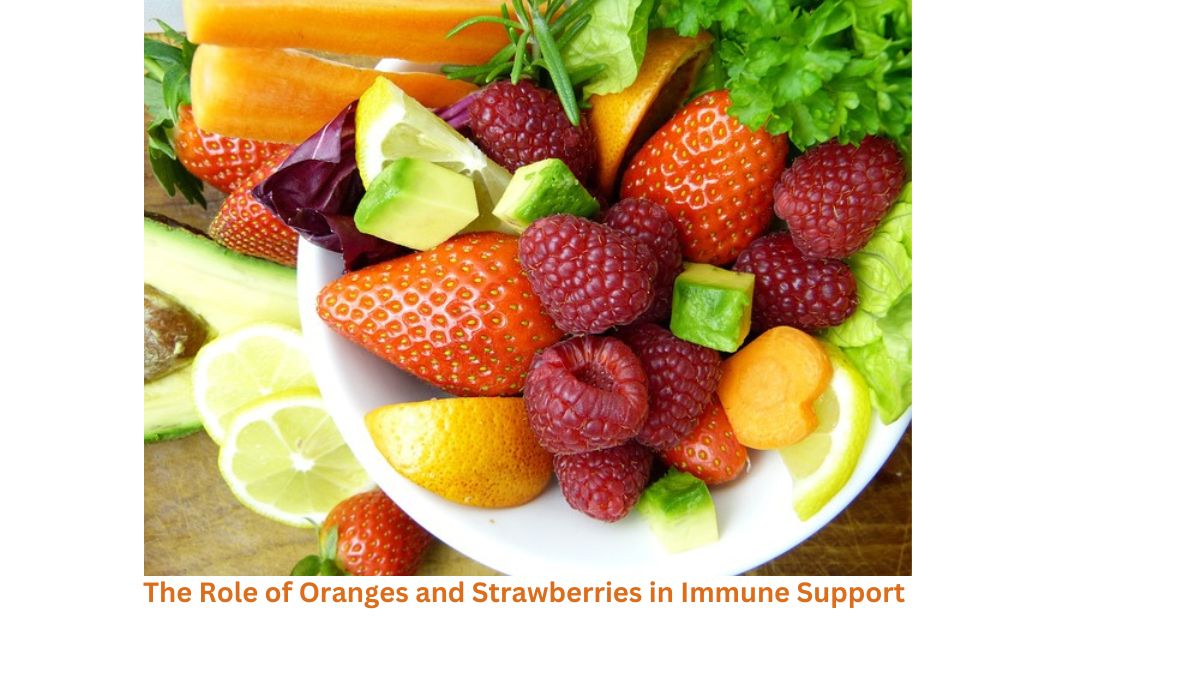Introduction :-
Nourishing Defense: The Role of Oranges and Strawberries in Immune Support

In the quest for a robust immune system, nature often provides the best solutions. Oranges and strawberries, beyond their delightful taste and vibrant colors, are powerhouse fruits packed with nutrients essential for supporting our body’s defense mechanisms. Let’s delve into the profound role these fruits play in nourishing our immunity
What makes oranges and strawberries more than just tasty treats, but rather nutritional powerhouses crucial for fortifying our body’s defense systems?
1. Rich in Vitamin C: Oranges and strawberries are renowned for their high vitamin C content. This vital nutrient is known to bolster the immune system by stimulating the production of white blood cells, which are integral to fighting off infections and illnesses.

2. Antioxidant Powerhouses: Both fruits are brimming with antioxidants, including flavonoids and polyphenols, which help combat oxidative stress in the body. By neutralizing harmful free radicals, antioxidants contribute to reducing inflammation and strengthening the immune response.
3. Immune-Boosting Minerals: Oranges and strawberries contain essential minerals such as potassium, magnesium, and manganese, which play pivotal roles in supporting immune function. These minerals aid in cellular processes and enzyme functions vital for a well-coordinated immune system.
4. Fiber for Gut Health: A healthy gut is closely linked to a robust immune system. Oranges and strawberries are excellent sources of dietary fiber, promoting optimal gut health by nourishing beneficial gut bacteria. A balanced gut microbiome is crucial for regulating immune responses and enhancing overall immunity.
5. Immune-Modulating Phytochemicals: Both fruits contain a variety of phytochemicals with immune-modulating properties. Compounds like hesperidin in oranges and ellagic acid in strawberries exhibit anti-inflammatory and immunomodulatory effects, contributing to a balanced immune function.
Incorporating Oranges and Strawberries into Your Diet
Now that we understand the immune-supportive benefits of oranges and strawberries, incorporating them into our daily diet becomes imperative. Here are some simple yet delicious ways to enjoy these fruits:
- Fresh Fruit Salad: Combine sliced oranges and strawberries with other seasonal fruits for a refreshing and nutritious salad.
- Smoothie Delight: Blend oranges, strawberries, yogurt, and a handful of spinach for a vibrant and immunity-boosting smoothie.
- Snack Attack: Enjoy oranges and strawberries as convenient, vitamin-packed snacks throughout the day.
- Dessert Indulgence: Top off your favorite desserts with slices of oranges and strawberries for a sweet and nutritious twist.
What are the key nutrients found in oranges and strawberries that contribute to immune support?
The key nutrients found in oranges and strawberries that contribute to immune support include:

- Vitamin C: Both oranges and strawberries are rich in vitamin C, a powerful antioxidant known for its role in boosting the immune system. Vitamin C helps stimulate the production of white blood cells, which are essential for fighting off infections.
- Antioxidants: Oranges and strawberries contain various antioxidants, such as flavonoids and polyphenols, which help neutralize harmful free radicals in the body. This antioxidant activity reduces inflammation and supports overall immune function.
- Fiber: Both fruits are good sources of dietary fiber, which promotes a healthy gut microbiome. A balanced gut microbiome is crucial for proper immune function, as it supports the growth of beneficial bacteria that play a role in immune regulation.
- Potassium: Oranges and strawberries are also rich in potassium, an electrolyte that helps regulate fluid balance in the body and supports nerve and muscle function. Potassium may indirectly contribute to immune health by supporting overall bodily functions.
- Vitamin A: Oranges contain beta-carotene, a precursor to vitamin A, while strawberries contain vitamin A directly. Vitamin A is important for maintaining the integrity of the skin and mucous membranes, which act as barriers against pathogens.
- Vitamin E: Oranges and strawberries provide small amounts of vitamin E, another antioxidant that helps protect cells from damage caused by free radicals. This can indirectly support immune function by preserving cellular health.
By incorporating oranges and strawberries into your diet, you can benefit from these essential nutrients that support a strong and resilient immune system.
Can regularly consuming oranges and strawberries help prevent common illnesses like colds and flu?
Regularly consuming oranges and strawberries can potentially help reduce the risk of common illnesses like colds and flu, although they may not entirely prevent them. Oranges and strawberries are rich in vitamin C, which is known to play a crucial role in supporting the immune system. Vitamin C helps stimulate the production of white blood cells, which are essential for fighting off infections. Additionally, vitamin C is an antioxidant that helps reduce inflammation and oxidative stress in the body, which can contribute to overall immune health.
Moreover, oranges and strawberries contain other important nutrients and antioxidants, such as fiber, potassium, and various phytochemicals, which can also support immune function indirectly by promoting overall health and well-being.
While regularly consuming oranges and strawberries can be beneficial for immune health, it’s important to note that they are just one part of a healthy and balanced diet. Other factors, such as adequate sleep, regular exercise, managing stress, and practicing good hygiene, also play significant roles in preventing illnesses like colds and flu.
Therefore, while oranges and strawberries can contribute to a strong immune system, they should be part of a comprehensive approach to overall health and wellness.
Are there any potential side effects or allergic reactions associated with consuming oranges and strawberries?
Yes, while oranges and strawberries are generally safe for most people, there are potential side effects and allergic reactions associated with consuming them:

Oranges:
- Citrus Allergy: Some individuals may have an allergy to citrus fruits like oranges. Symptoms of a citrus allergy can include skin rash, itching, swelling, difficulty breathing, and gastrointestinal discomfort. Citrus fruits contain allergenic proteins that can trigger allergic reactions in susceptible individuals.
- Heartburn or Acid Reflux: Oranges are acidic fruits, which may trigger heartburn or worsen symptoms of acid reflux in some people, particularly those with gastroesophageal reflux disease (GERD).
- Interaction with Medications: Oranges contain compounds that can interact with certain medications. For example, consuming large amounts of oranges or orange juice may affect the absorption of medications such as certain antibiotics, antihistamines, and calcium channel blockers.
Strawberries:
- Allergic Reactions: Some individuals may be allergic to strawberries, which can cause symptoms such as skin rash, itching, swelling, difficulty breathing, and gastrointestinal discomfort. Strawberry allergy is less common than citrus allergy but can still occur in susceptible individuals.
- Oral Allergy Syndrome (OAS): People with pollen allergies, such as birch pollen allergy, may experience oral allergy syndrome (OAS) when consuming strawberries. OAS can cause itching or swelling of the mouth, lips, tongue, or throat shortly after eating strawberries.
- Pesticide Residues: Strawberries are often heavily sprayed with pesticides, which can pose health risks if consumed in large quantities. Washing strawberries thoroughly before consuming them can help reduce pesticide residues.
It’s essential to be aware of these potential side effects and allergic reactions and to consult with a healthcare professional if you have any concerns or experience adverse effects after consuming oranges or strawberries. Additionally, individuals with known allergies or sensitivities should avoid consuming these fruits or speak with a healthcare provider for guidance.
Conclusion
In the realm of immune support, the inclusion of oranges and strawberries in our diet serves as a cornerstone for maintaining optimal health. From their vitamin C-rich profile to their antioxidant properties and gut-nourishing fiber, these fruits offer a holistic approach to fortifying our body’s defenses. Embrace the bounty of nature and let oranges and strawberries be your allies in nurturing a resilient immune system.








